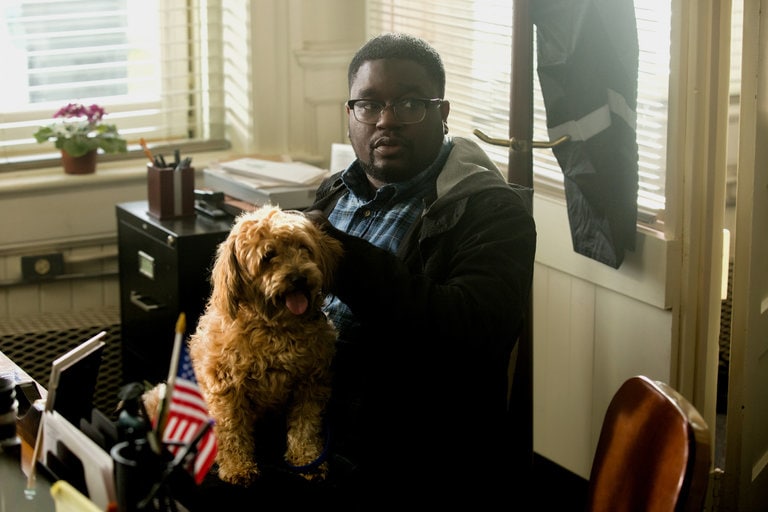 Milton "Lil Rel" Howery as Rod in Get Out.
Universal Pictures
Milton "Lil Rel" Howery as Rod in Get Out.
Universal Pictures
In the brand new horror film Get Out, a boisterous TSA agent named Rod, best friend to the protagonist Chris, sets the tone for the film's first truly scary moment by lulling the viewer into a few laughs. Played winkingly by the comedian and The Carmichael Show star, Milton "Lil Rel" Howery, Rod is the voice of the audience throughout Get Out, a film about sinister threats lurking behind racial paranoia. In his 2016 Netflix special, Kevin Hart Presents Lil Rel: RELevant, the comedian animates the regular, working people of his hometown of Harvey, Illinois. And in Get Out, Rel brings that same wit to playing a lowly TSA agent who is devoted to his job and his BFF, turning a character who might ordinarily be mere comic relief into something more dynamic and a real filmic folk hero.
At the end of a brilliant first box office week, The FADER spoke to Lil Rel about working on Get Out with Jordan Peele, and why people should find significance in film's scary and funny moments.
Congrats! How does it feel to be involved in a project that's getting a lot of love from both critics and audiences?
It’s exciting, especially when you pick a script that you think is really good, and it’s not a big budget film, and you’re not sure if a lot of people are gonna see it. So your attitude going in is just, ‘Alright, this is a fun project to work on!’ [When I first read the script] it felt like the realer version of, Guess Who’s Coming To Dinner. In my family, personally, there are all these myths of, ‘This is what’ll happen if you do this,’ and with Get Out it's the first time I’ve seen someone write those myths into a movie. And Jordan's not doing it in such a light way either — this is the dark version!
Your character, Rod the TSA agent, is becoming a fan favorite. Why do you think people connect with Rod?
To have someone who speaks specifically to the audience perspective, I don’t know if I’ve ever seen that in a horror film before. And I guess I’m starting to really understand how much of a hero Rod was. The way that I do my standup: the character matched that. There aren’t too many roles where you’re like, ‘Oh I can talk like myself!’ Jordan is also a comedian who knows that voice too — it honestly makes him a genius to me to put that comedy with this specific situation, where it’s not a satire or where you’re like ‘it’s not real.’ The comedy and the horror in this movie are both real things.
I'm surprised they kept a few of these scenes [where I'm riffing]! Like that scene at the police station, you can almost see me stumbling through words! There’s going to be some bonus stuff thrown in when the DVD comes out that’s going to be crazy. Y’all think y’all heard all the funny stuff I was saying but it’s a whole list of things! And you’re going to get the alternate ending also; that DVD is going to be a must-have.
I was going to ask if the last scene was the only ending you filmed.
No, the original ending is darker and realer. I can’t spoil it for you! It’s literally whatever the audience thought was going to happen the first time is what happens. [Laughs] That’s all I’m going to say!
In your opinion, what is the central fear of this movie rooted in?
It goes back to the way I grew up; I’m just being honest. Segregation created this. Stories about people like Emmett Till. It’s history; crazy things have happened, so people are going to embellish and pass that onto their kids as a warning. Jordan was so smart to hit on all these stories that could be considered myths, but a lot of it is rooted in truth.
I think white people, and other nonblack people, believe that pushing back on racism is rooted solely in anger — but this movie makes clear that, no, it's also very real fear.
It’s fear, and it’s jealousy. Think about how why this whole thing happened: Jesse Owens beat the grandfather, and he couldn’t handle it. He’s running around at night, thinking about losing the race, and he just wants the black man’s natural, athletic body.
It's also been great to watch Get Out's success come the same week that Moonlight won Best Picture at the Academy Awards. Do you think Hollywood is becoming more receptive to black stories?
We’re writing better characters and stories, and I’m not saying we haven’t done that in the past, but — even Moonlight. That movie is special because there are things in the black community we don’t deal with, as far as homophobia, you know what I mean? And people also don’t see dope dealers like that — he’s still a human being, he has a heart, and he’s not homophobic; he accepted that little boy for who he was. I love movies that show empathy. I’m happy that that was a mistake and Moonlight got that look. It inspires writers to tell these real stories, to dig deep and talk about these things that we want to talk about. I think that’s what Get Out does too, and I’m interested to see if our movie is going to be looked at a certain way, when it comes award season.